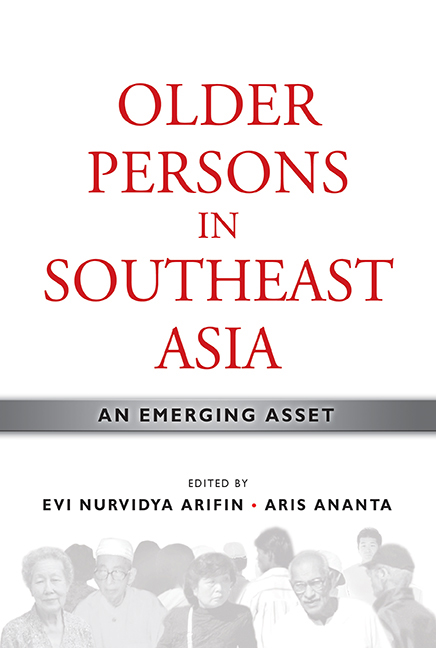Book contents
- Frontmatter
- Contents
- List of Tables
- List of Figures
- Foreword by Hal Hill
- Message from the Director
- Preface
- Contributors
- PART I INTRODUCTION
- PART II OLD-AGE INCOME SECURITY
- 3 Economics and Old Age: The Singapore Experience
- 4 National Long-Term-Care Severe Disability Insurance in Singapore
- 5 Social Security and Health Care Financing for Older Persons in Thailand: New Challenges
- 6 An Exploration of a Universal Non-contributory Pension Scheme in Vietnam
- PART III EMPLOYMENT AND OTHER SOURCES OF FINANCIAL CONTRIBUTION
- PART IV AGEING, MIGRATION, AND DEVELOPMENT
- PART V ROLES OF GOVERNMENT AND CIVIL SOCIETY
- Index
5 - Social Security and Health Care Financing for Older Persons in Thailand: New Challenges
from PART II - OLD-AGE INCOME SECURITY
Published online by Cambridge University Press: 21 October 2015
- Frontmatter
- Contents
- List of Tables
- List of Figures
- Foreword by Hal Hill
- Message from the Director
- Preface
- Contributors
- PART I INTRODUCTION
- PART II OLD-AGE INCOME SECURITY
- 3 Economics and Old Age: The Singapore Experience
- 4 National Long-Term-Care Severe Disability Insurance in Singapore
- 5 Social Security and Health Care Financing for Older Persons in Thailand: New Challenges
- 6 An Exploration of a Universal Non-contributory Pension Scheme in Vietnam
- PART III EMPLOYMENT AND OTHER SOURCES OF FINANCIAL CONTRIBUTION
- PART IV AGEING, MIGRATION, AND DEVELOPMENT
- PART V ROLES OF GOVERNMENT AND CIVIL SOCIETY
- Index
Summary
Rapid mortality decline and the resulting higher life expectancy in many countries occur because of progress in medical technologies and improved health facilities, services and sanitation. Coupled with the concurrent rapid fertility decline, the fast decline in death rate has resulted in ageing populations everywhere in the world. The number of older persons in Asia and the Pacific region, particularly Thailand, is growing at an exceptional rate.
In the twenty-first century, population ageing has become a global phenomenon: the proportion of older persons in the world increased from 8.2 per cent in 1950 to 10.0 per cent in 2000. It is projected to increase to 15.0 per cent and 21.0 per cent in 2025 and 2050, respectively. In Southeast Asia, the number of older persons increased from 11.4 million persons in 1950 to 40.3 million in 2000, and 203.5 million in 2050. In other words, the number of older persons in Southeast Asia grew 6.7 per cent annually from 1950–2000 and will accelerate in the first half of the twenty-first century to 8.7 per cent annually from 2000–25, and to an even faster rate of 11.4 per cent annually from 2025 50. Moreover, from 2000–50 the number of older persons in Southeast Asia will increase by about 163.2 million, more than five times the increase (about 29.0 million) from 1950–2000. (UNFPA 2006).
It is evident that population ageing will be seen as an emerging issue, with the challenge being both the larger number of older persons, and a more uphill task in dealing with the ageing situation in the first half of the twenty-first century. Various challenges arising as a result of the ageing population are rising demand for health services, growing requirements for long-term care, declining family support, and increasing needs of income and social security. Furthermore, rapid ageing in Southeast Asia is also accompanied by its concurrently undergoing economic, social, political, and technological transitions. Thus, population ageing in Southeast Asia has raised many fundamental questions such as: How do the older persons remain independent and active economically in order to reduce the burden on the younger population? How will the government change the financing of health care services and social security systems?
- Type
- Chapter
- Information
- Older Persons in Southeast AsiaAn Emerging Asset, pp. 116 - 139Publisher: ISEAS–Yusof Ishak InstitutePrint publication year: 2009

